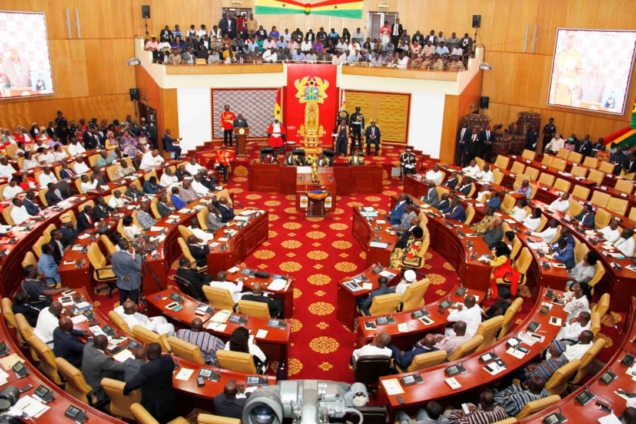Political Scientist and CDD Fellow, Dr. John Osae-Kwapong, has welcomed parliament’s revised standing orders.
According to him, the new standing orders will place the legislature in a better position to carry out its oversight mandate more efficiently.
“In a lot of our public discourse, we keep saying that parliament is weak, parliament is not a strong institution, that we’ve designed an imperial presidency, an imperial executive. I have been arguing that for me the weakness that people have been refering to when it comes to parliament is not so much that it is weak in design but at least in my opinion, I believe parliament doesn’t flex it powers enough. So for me, more oversight can never hurt the purpose of good governance,” he said.
Speaking on JoyNews’ PM Express, he noted that concerns about what has been described as an overreach of parliamentary powers are quite unfounded.
He explained that as parliament is entrusted with oversight responsibility, especially of the executive, it is supposed to pass laws that will ensure that such duties are carried out smoothly for the sake of transparency and accountability.
“In principle I don’t think parliament is overreaching, afterall in our constitutional design they’re empowered to be the ones who provide oversight over especially the executive arm of government. And so thinking about this within the context of their oversight responsibility, I don’t think they’re overreaching,” he said.
Parliament has conducted a sweeping revision of its standing orders for the first time since 2000.
The revised standing orders is to among other things empower the legislature carry out its mandate of checks and balance.
Among the revision including the introduction of at least three new committees including a budget committee to be headed by an opposition figure that will be mandated to assist the finance ministry draw yearly budgets.
Dr. Osae-Kwapong is convinced that some of the new standing orders will, however, face legal challenges especially in relation to the oversight role of the legislature over indepndent constitutional bodies.
Some have argued the new standing orders are an encroachment on the independence of said constitutional bodies and could undermine their functions.
However, the political scientist argues that “independence doesn’t mean lack of accountability.”
“That there are certain bodies designed as independent bodies I agree with that and I support that, but I don’t think that being an independent body should insulate you from oversight and accountability. And so it becomes a question of; how do you balance that respect and appreciation of that independent constitutional bodies whilst at the same time allowing an institution like parliament to provide the necessary oversight and accountability as well,” he said.
Latest Stories
-
Mahama pledges 70% world market cocoa price to farmers
17 minutes -
EOCO teams up with Nigerian agency to rescue trafficking victims
17 minutes -
State funeral to be held for Joseph Kobina Ade Coker on August 1
18 minutes -
Mahama orders arrest of fake anti-galamsey taskforce extorting miners
1 hour -
Joseph Kobina Ade Shino Coker
1 hour -
Royal Sweet Limited signs up for JoySports Invitational Tournament 2025
2 hours -
Ghanaian movie industry wasting talent – Gloria Sarfo
2 hours -
Ho West MP secures 100 international scholarships for constituents
2 hours -
Bank of America’s Bernard Mensah discusses AI, jobs and global economic pressures
2 hours -
President Mahama announces plans to build six modern sports stadia
2 hours -
Expert wants gov’t to extend NSS allowance beyond service period
2 hours -
Western North: Mahama pledges action over ‘empty slogans’
2 hours -
Ghanaian AI startup Fornix Labs pilots tool to support workload of doctors
3 hours -
CCTV captures woman allegedly stealing baby at Ajumako market
3 hours -
WAFU B Boys Cup: Black Satellites take on Benin U-20 in second group game
3 hours

